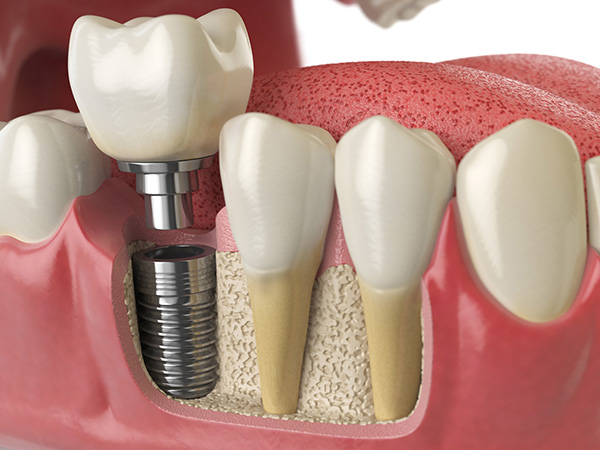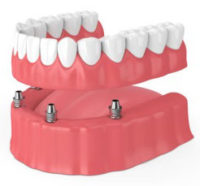Dental Implants
What Is A Dental Implant?
Dental implants are perhaps the most predictable and technologically advanced method of replacing missing teeth in patients of all ages. They are an excellent long-term option for restoring your smile. A titanium post is placed into your jaw and imitates the root of your tooth, actually becoming biologically apart of your jaw. Then an artificial tooth is placed on the titanium post to imitate your tooth.

 Dentures can be very difficult to wear, particularly in those who have worn them for a long time. To greatly improve the retention of dentures, our patients can choose to have im-plants placed into the jaw, which is then connect to the denture. This helps to stabilise the denture.
Dentures can be very difficult to wear, particularly in those who have worn them for a long time. To greatly improve the retention of dentures, our patients can choose to have im-plants placed into the jaw, which is then connect to the denture. This helps to stabilise the denture.
- Improved appearance: Dental implants look and feel like your own teeth.
- Improved comfort: Because they become part of you, implants eliminate the dis-comfort of removable dentures.
- Easier eating: Ill-fitting dentures can make chewing difficult. Dental implants func-tion like your own teeth, allowing you to eat your favourite foods with confidence.
- Improved self-esteem: Dental implants can give you back your smile and new lease of life.
- Improved oral health: Dental implants don’t require reducing other teeth, as a tooth-supported bridge does. Because nearby teeth are not altered to support the implant, more of your own teeth are left intact, improving long-term oral health. In-dividual implants also allow easier access between teeth, improving oral hygiene.
- Durability: Implants are very durable and with proper care can last a lifetime.
- Convenience: Removable dentures are just that; removable. Dental implants elim-inate the embarrassing inconvenience of removing dentures, as well as the need for messy adhesives to keep them in place.
There are some age restrictions for dental implants. Dental implants can be placed in individuals once they have stopped growing, provided they have adequate bone in the area of the missing tooth. This can be assessed by a 3-dimensional image called a CBCT, which can be taken in our office.
In some patients, there is not enough bone in their jaw to allow dental implants to be in-serted and a bone graft is needed to INCREASE the amount of bone available.
What happens during bone grafting?
When a small amount of bone is needed, we can transfer bone from one part of the jaw to the other. The bone graft is normally taken from the back of the jaw or chin area. This can be done under local anaesthesia and with or without sedation(to relax you).
- The gum is lifted away from the underlying bone where the graft is to be placed and the amount of bone needed is assessed.
- The bone is then taken from another part of your jaw after lifting the overly-ing gum and carefully drilling into the bone.
- The dentist will place the bone to be grafted onto the recipient site.
- The graft may be fixed in position with small pins or screws that can be re-moved when the implants are placed.
- The gum is replaced and stitched carefully back in place.
- The surgery usually takes 60-90 minutes.
- The stitches are removed about a week later.
Once the graft has been confirm as successful and the site of the bone graft is totally healed, the next stage of the dental implant process can begin.
What are the risks?
- Pain, bruising and swelling in the area, this may last 1-2 weeks.
- Infection.
- Insufficient successful graft bone to accept implants, further grafting may be necessary.
- Risk of failure higher in certain individuals, particularly those who smoke.
- Higher risk of failure of implants placed into grafted bone rather than natu-ral bone.
Alternatives?
Synthetic bone substitutes or bone from animals or other humans can be used but do not perform a well as your natural bone, it is less likely that your body rejects your natural bone.
Dental implants are designed to last a lifetime, and proper care is fundamental to help ensure the longevity of your implant. Just like natural teeth, implants require regular dental check-ups and persistent oral hygiene. Complications are rare following a dental implant, however, by following some basic guidelines, the implant can be maintained for decades as with the function and appearance.
Below are guidelines for the aftercare of your implant:
After Surgery
Do not disturb the wound. Avoid rinsing, spitting, or touching the wound the day of surgery. Avoid biting your tongue/cheek or lip following the administration of local anaesthetic.
Bleeding
Some bleeding or redness in the saliva is normal for 24 hours post implant placement. Excessive bleeding can be controlled by biting on a gauze pad placed directly on the bleeding wound for 30 minutes. We will provide you with this. If bleeding continues please contact the clinic for further instructions.
Swelling
Swelling is a normal occurrence after surgery. To minimise swelling, apply an ice bag on the cheek in the area of surgery. Apply continuously, as much as possible, for the first 36 hours.
Diet
Avoid hot liquids or food directly after surgery and until the anaesthetic has worn off. Drink plenty of fluids. Change to a soft diet on the day of surgery. Return to a normal diet as soon as possible unless otherwise directed.
Pain
You should begin taking pain medication which your dentist has prescribed as soon as you feel the local anaesthetic wearing off. For moderate pain Ibuprofen may be taken . 2-3 200mg tablets may be taken every 3-4 hours as needed for pain. For severe pain, the prescribed medication should be taken as directed. Do not take any of the above medication if you are allergic, or have been instructed by your doctor not to take it.
Antibiotics
Please be sure take the prescribed antibiotics as directed to help prevent infection around the Dental Implant.
Oral Hygiene
Good oral hygiene is essential following a dental implant. The day after surgery, Corsodyl mouth rinse should be used twice daily, after breakfast and before bed. Be sure to rinse for at least 30 seconds then spit it out. Warm salt-water rinses (teaspoon of salt in a cup of warm water) should be used at least 4-5 times a day. Brush your teeth and the healing as normal or as directed by your dentist or hygienist. Be gentle initially with brushing the surgical areas.
Activity & Alcohol
Restrict physical activities the day of surgery. Avoid drinking alcohol for 24 hours after the procedure.
Wearing your Prosthesis
Partial dentures or full dentures should not be used immediately after surgery and for at least 7 days.
